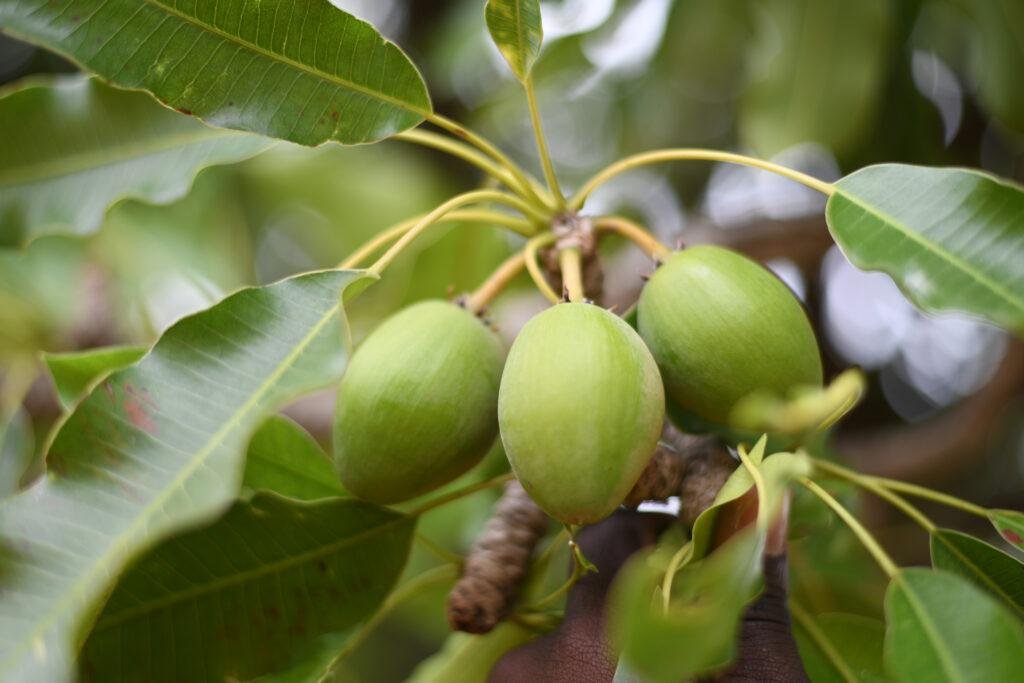News
Shea fruit: Savanah’s overlooked edible treasure

Every year between May and August, Northern Ghana comes alive with the shea season.
While most people know the shea tree for its butter used in cooking, cosmetics, and traditional medicine, few outside the region have tasted its fruit fresh from the branch.
The shea fruit is small, oval, and green when unripe. It turns yellowish when ready to eat. Beneath the thin skin lies a sweet, creamy pulp with a flavour often described as a cross between mango and avocado.
The taste is subtle but refreshing, and for many in the north, it is a seasonal delight that marks the beginning of the rains.
In rural communities, children are the first to take advantage of the bounty. At dawn, they collect fallen fruits under the trees, eating them on the way to school. Farmers, too keep a few in their pockets to snack on during long hours on the fields.
For older folks, the shea fruit brings back memories of childhood breakfasts and the joy of sharing food that cannot be stored or sold for long.
For others, the fruit is a seasonal business opportunity. Women and children often gather the fallen fruits and sell them in small bowls at local markets.

Rahama, a market woman at the Tamale Central market, said she sells a bowl of shea fruit for between GH¢5 and GH¢10, depending on the size.
She also mentioned that though the price is peanut, comparing the risk of gathering them in the bush, it helps to buy soap or pay for the children’s school needs.
“Shea butter brings bigger income later, but the fruit gives us quick cash,” she said.
Speaking to Musah Alhassan from Tolon, a 29-year-old farmer, he stated that he eats the fruit almost every day because of the health benefit.
He said, unlike sweets, it doesn’t leave you thirsty or tired during the season, saying that, “we grew up eating shea fruit every year. It makes you strong, gives you energy for the farm, and you hardly fall sick during the season.”
Mr Eric Banye, an Industry expert says the fruit deserves more recognition for its nutritional and economic potential. He also stated that the shea tree is celebrated globally for its butter, but the fruit is an overlooked treasure.
“It provides rural households with vitamins, quick income, and food security during the lean season. Promoting shea fruit consumption could add another dimension to the value chain while preserving cultural traditions,” he explained.
He stated that by continuous protection, over 5,000 hectares of shea trees destroyed annually for charcoal will be saved as the Northern region battles desertification.
Beyond its sweetness, the shea fruit is packed with vitamins and minerals, particularly vitamin C and potassium, which support immunity and heart health. It also contains natural antioxidants that help the body fight inflammation.
Furthermore, Mr Banye noted that, comparatively, the shea butter lasts for months, but the fruit must be eaten within days when it matures because it spoils quickly, making it a gift best enjoyed under the very tree that bore it.
This fleeting nature adds to its charm, reminding locals that the shea tree doesn’t only add economic resource but also a seasonal source of nourishment and pleasure.
In the rush for shea butter exports, the humble fruit is often overlooked. But in Northern Ghana, its short-lived sweetness, its hidden health benefits, and its modest economic value remain a cherished taste of home.
From: Geoffrey Buta, Tamale
Join our WhatsApp Channel now!
https://whatsapp.com/channel/0029VbBElzjInlqHhl1aTU27
News
Damango wages war on shisha smoking among minors

Troubled and anxious citizens in Damongo of the Savannah Region have expressed concerns about the number of young people, believed to be under the age of 18, involved in ‘shisha’ smoking in pubs and drinking spots within the township.
Eyewitnesses say the minors were seen patronising nightlife venues, where Shisha smoking happen in the open.
The situation has sparked renewed public concern over the enforcement of child protection laws and regulations governing the operations of entertainment centres in the municipality and country as a whole.
An eyewitness, who spoke to The Spectator on conditions of anonymity for security reasons, noted that the situation was becoming increasingly common.
“This is not a one-off incident. It is becoming very common, but residents like us cannot openly report or speak about it because our lives will be at risk,” he said.
Under Ghanaian law, minors were prohibited from patronising Shisha.
Public health experts have consistently warned that shisha use exposes users to harmful substances that can negatively affect brain development, respiratory health, and overall well-being, particularly among young people.
The residents believe the alleged incidents point to broader challenges relating to youth supervision, substance abuse, and weak enforcement of existing regulations and have called on municipal authorities, security agencies, and regulatory bodies to intensify monitoring of pubs and entertainment centres to ensure compliance with the law.
In an effort to address the menace, Mr Salisu Be-Awurbi, the Savannah Regional Minister, has led public education campaigns, engaged security agencies, and supported enforcement actions to address the rising use of illicit substances in the region.
Wura Kelly Seidu Boresah I, the Chief of Damongo, has also called on all stakeholders including parents, community leaders, institutions, and young people to actively support efforts to curb drug abuse, warning that the rising consumption of hard drugs poses a serious health threat to the future of the youth in the Savannah Region.
He also cautioned individuals involved in the sale and distribution of illicit drugs to immediately desist from the practice, stressing that offenders will face arrest and prosecution in accordance with the law.
From Geoffrey Buta, Damongo, Savannah Region
Join our WhatsApp Channel now!
https://whatsapp.com/channel/0029VbBElzjInlqHhl1aTU27
News
Ga Mantse endorses initiative to end domestic voilence

Dr Theresa Baffour, an advocate for ending violence and Chief Executive Officer (CEO) of SAHM SAHW Foundation, has said that society plays a critical and pivotal role in breaking the cycle of domestic violence.
According to her, domestic violence is a major contributor of making women, who are mostly the victims, mentally derailed and unable to engage in economic activities.
She said this when the foundation called on the Ga Mantse, Nii Tackie Teiko Tsuru II, to solicit support for the initiative by the “Strong and Healthy Minds, Strong and Healthy Women” (SAHM SAHW) to combat domestic violence within the Ga State.
The visit was occasioned by the fact that domestic violence cases have become quite prevalent in the Ga communities and is retarding growth.
According to her, the canker was an impediment to national development because the victims were usually tortured and would have to go through series of therapies to return to the right state of mind.
Dr Baffour mentioned that Gender-Based Violence (GBV) places a mental toll on women, and was, therefore, important to break the cycle through comprehensive mental health support, crisis intervention and empowerment programmes in communities with high rates of GBV.
This intervention, she underscored, would help in empowering the denigrated victim of domestic violence to soundly heal, build and thrive.
Dr Baffour added that the initiative would provide holistic, trauma-informed mental health care and advocacy for young women affected by domestic violence.
According to her, the above statement would create safe spaces for healing and equipping them with entrepreneurial skills for renewed hope and empowered life.
The Ga Mantse pledged his support for the laudable initiative to combat domestic violence and also acknowledged the need to address it in the Ga State.
Further endorsement came from Justice Julia Naa-Yarley Adjei Amoah, Chief of Staff at the Office of the Ga Mantse, as she commended the team of SAHM SAHW Foundation for taking a bold step to end the canker in the Greater Accra.
She added that it was a step in the right direction to save vulnerable women from torture, stress and emotional abuse.
By Alfred Nii Arday Ankrah














